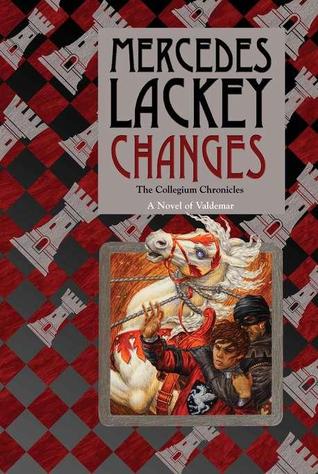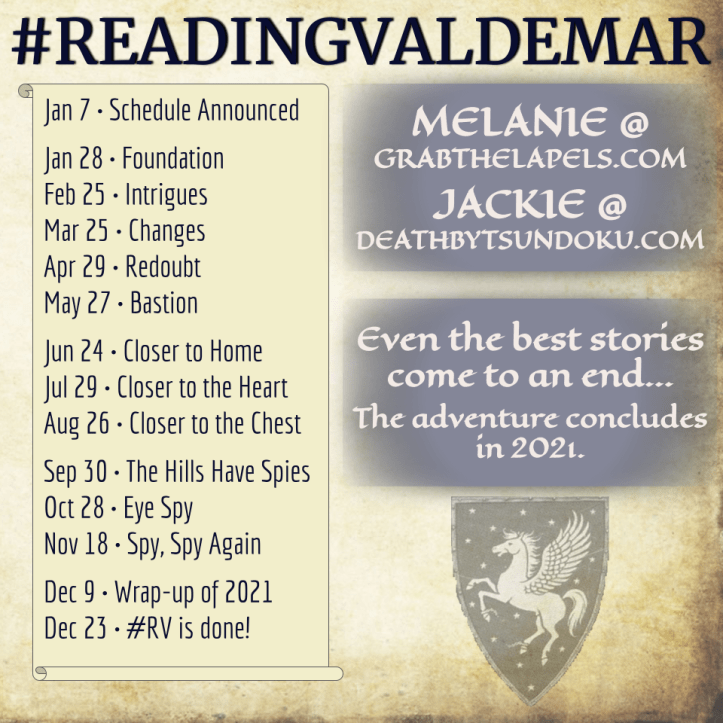SYNOPSIS
Changes by Mercedes Lackey is the third book in a quintet series known as the Collegium Chronicles. Our lead character, Mags, is still a Herald Trainee attending classes, and sports practices that prepare students for battle. His training expands, though, when suggestions that Mags could train as a spy with the King’s Own Herald Nikolas, an advisor to Valdemar’s crown, become reality. Playing a deaf jeweler, Mags listens in as Nikolas, in his disguise as a trader called the Weasel, tries to gather information from unscrupulous citizens and foreigners who may have some knowledge of a possible attack on the kingdom. This is all spying in the name of prevention. Mags and Nikolas learn that the attack sustained in the previous book by some unknown leader who sends his/her worst each time may not have been the last. So, here we are with two new villains; except, the problem is Valdemar doesn’t know what the evildoers want, and Mags cannot find them because they have some unrecognizable shield that hides their presence. Will they choose a target that would crumple the kingdom? And who would that be? Or is it something else entirely? Who knows?!
HIGHS & LOWS
My first beef is that these two villains seem so similar to the ones in Foundation and Intrigues that I wasn’t afraid of their actions. Each novel made the “bad guys” seem like there could be no one worse than they, only for Lackey to throw in some new ruffians who are only modestly different. This is the third book in a series, not another boss level in a Nintendo game. Move the plot along with a villain who has something to achieve of which I am aware in the duration of the novel — not revealed in the last chapter, please! To be fair, Lackey’s young adult series does make use of little level-ups in the same way other series do, and readers are often on board for that. Has she simply found a formula that works for many and capitalized upon it?
Then again, there was plenty of room for Lackey to expand through teaching. Mags is learning how to be a spy from Nikolas, or so we’re told. Mostly, Mags figures out everything for himself, sometimes even surprising his mentor, and I can’t remember a single example of Nikolas informing Mags of a trick or some obfuscated logic. Basically, Lackey missed a key opportunity to push the quintet meaningfully forward.
Not only are the villains similar, we’re still reading about Lena, the Bard trainee, and Bear, the Healer trainee, crying about their parents. Lina’s father is a master Bard, totally respected but also a manipulative, negligent human, especially when it comes to his daughter. Bear’s family views him as an abomination because he’s learning to be a Healer without the Healing Gift. Instead, he’s basically training as a regular doctor in a family full of Gifted Healers, and they want him to leave the collegium, go home, get married, and father a bunch of children who may be blessed with the Healing Gift that they know and respect. Both characters have been crying — literally and figuratively — for three books.
The problem is I cannot tell how old these characters are. If they’re twelve or thirteen, it might make sense because they’d rely on family for a sense of identity and purpose. But, that would be odd, because Bear is an excellent, albeit unGifted, Healer . . . as a tween? I’m not buying that; he must be older. One new plot point is that Bear is working on a model and surgical plan to repair Nikolas’s daughter Amily’s leg, which was crushed in a carriage accident and healed incorrectly, making the limb useless for mobility. Lackey has failed to provide clear time stamps. Yes, there is snow and summer, but I’ve lost track of if summer is the same summer or actually next summer, so tracking the years is not practical. One of my only solid clues is that Mags and Amily have started a romantic attachment, which would suggest to me at least sixteen.
To keep her characters from crying all the time, Lackey would have done well to imagine some sort of therapist Gift. The trainees are almost all children, who can come from any background before being Chosen. Who are they talking to about their trauma, such as child abuse, starvation, and homelessness? Even the older Heralds would need a therapist. Instead, they seemingly “get over” witnessing violence on the battle field, death of family, rape, torture, and their own near-death experiences with time — and no lasting effects.
Then ending was where Lackey recaptured my attention in Changes. I did enjoy watching Amily and Mags confess their feelings for each other in an organic way, and she writes action scenes well. After a big chase and capture, Amily and Mags are reunited only to learn that our two new villains . . . have revealed nothing about the larger plot to do something bad to Valdemar. It’s a cliffhanger, but I’m simply expecting a new evildoer with the same objective in the next novel. Overall, Changes felt like the fifth wheel in the quintet, which I hope I don’t regret writing because there are still two more books.
DISCUSSION QUESTION
Series are such a tricky thing, and yet trilogies are a normal part of Western literature. We all know about that middle book slump in a trilogy, and now I’ve learned the same thing can happen when there are five books, too. Do you enjoy reading series? Are they chronological, like The Collegium Chronicles, or are do they stand alone, like Agatha Christie’s Hercule Poirot books? What do you do when you read a book in a chronological series that disappoints you? Do you continue with the series?





Oh wow– I feel like we had the same reaction to this book! And I thought I was going to be alone in this. Yes, there were so many missed opportunities in this tale. I wanted so much more. Perhaps because I know Lackey is capable of more, I was even more disappointed? I do like your observation that Lackey might be following a more modern YA formula– that never occurred to me and definitely clicks. I wonder if perhaps she was guided this direction to try and rekindle Valdemar during a resurgence of YA fantasy? Hm. Something to ponder.
I am looking forward to Redoubt, but I am not expecting this pattern to change now. Alas. I miss Lackey’s trilogies. Perhaps she just spread things too thin?
LikeLike
Yesterday, I was perusing Goodreads and what people thought of Changes. Lots of folks kept calling the novel a Harry Potter rip-off. I can see why people compare the games in both novels, but they’ve also been claiming Lackey ripped Rowling off since Talia’s books, which came out in the 1980s, so, who knows.
I read the synopsis for the next book, and I’m super worried it’s just going to be another mysterious person do the same mustache-twisting deeds. I don’t mind the villains getting worse and worse, but I want some clues as to what is going on in general. Just some crumbs.
LikeLiked by 1 person
I read some reviews of Foundation and Intrigues on GR and I saw the same calls out of parallels to Harry Potter. I see more parallels in The Collegium Chronicles than in the other books of hers — with the Mags/Bear/Lena trio (though they aren’t really solving problems together per se…) and the Kirball game. But that’s about it. I think fantasy readers just have HP as an anchor now for their perspective of fantasy books. Comparisons do a disservice to creative works in my opinion. Kim and I have chatted about this in the past before… it’s better when you AREN’T expecting Harry Potter when you pick up a book, in my opinion.
Oh dear. I am afraid of Redoubt now. I want more than mustache-twisting! I like villians who evolve over time. I’m not really connected to the Big Bad here. Also, do you think they are really Karsite?! I feel like that’s a Red Herring.
LikeLike
I think the plotting is just weak enough that I actually don’t know what to think. I mean, we had a kidnap-the-girl, end with a high-speed chase thing…..I just don’t get what the heck this person/people want. Why don’t they do something new, like try to kidnap a Companion to see if they can genetically make their own spirit animals, or something.
LikeLiked by 1 person
I mean, this is why I don’t think they are Karsite. The Karsites should know how to get their own spirit animals! 😉
My book arrived at the library today. I’m interested to see how Redoubt goes. We’d better get some motivations for these baddies to finally be transparent!
LikeLike
Yes! Something to move us forward. And I don’t want to hear another word about Lena’s and Bear’s parents.
LikeLiked by 1 person
This looks like a really interesting series, even with some lows. I haven’t heard of it before but I definitely want to check it out now!
LikeLike
I would absolutely recommend starting with Vanyel’s trilogy (Magic’s Pawn, Magic’s Promise, Magic’s Price) and then read Talia’s series (Arrows of the Queen, Arrow’s Flight, Arrow’s Fall).
LikeLiked by 1 person
This is a middle grade series, if I’m remembering correctly? I struggle with that age range in adulthood so much even when the books are great, but all of your complaints here make me certain I would not be able to get through this one even with some payoffs waiting at the end. I think for me, whether I continue a series after a disappointing volume depends on how much I disliked it- I think seasoned series readers tend to develop a gut instinct for the difference between a single book that’s not working (worth persevering through) and a whole series taking a bad turn (time to abandon ship). When it’s working well, I definitely prefer sequential series that have to be read in order. If I’m going to be reading that much, I want to be rewarded for remembering things from one book to the next and I don’t like repetition; series books that can stand alone often feel repetitive to me when read all together. And there’s just a special sort of magic in a story that, with all the books put together, can run on seamlessly for thousands of pages. I’m a big fan of long-form fiction (even though the time it takes to read can be a daunting commitment!), and series are the ultimate long form.
I hope the last two books of this set will turn things around for you!
LikeLike
Well, Jackie sent me a picture of her reading the next book and her baby passed out while Jackie was reading it to her, so I’m having doubts! Hahaha, okay, baby is still super wee, so she might just have been tired. I think at this point Jackie and I are both striving for completion. I texted her the other day that ANOTHER new book is coming out in couple of months, but we hadn’t planned to continue reading after 2021. Joke is on us; neither one of us can fathom stopping and saying we DIDN’T read all of them.
I do like your point about recognizing a bad book vs. a bad series. In a lot of the trilogies we’ve read we’ve talked about the middle book slump knowing that things will get better in the third book.
I’m not sure what reading level Valdemar is?? I read them first when I was in high school (10th grade) and many of the characters are middle-teen aged.
LikeLiked by 1 person